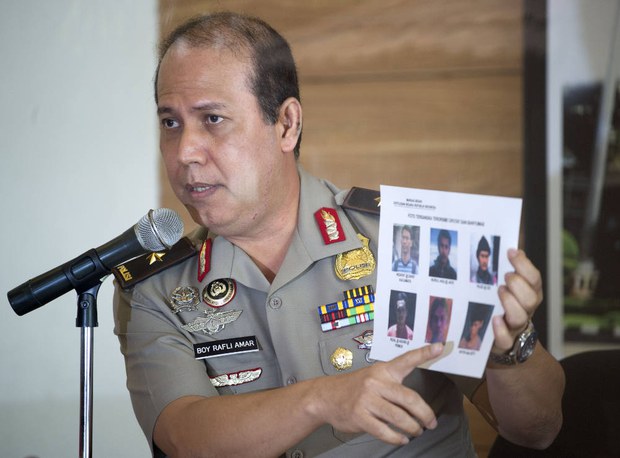Indonesia Taps Ex-Police Spokesman to Replace Anti-terrorism Chief
2020.05.01
Jakarta
 Boy Rafli Amar, then the Indonesian national police spokesman, points to photos of six dead suspected militants during a news conference in Jakarta, Jan. 3, 2014.
Boy Rafli Amar, then the Indonesian national police spokesman, points to photos of six dead suspected militants during a news conference in Jakarta, Jan. 3, 2014.
A career officer who once served as police chief in Indonesia’s insurgency-hit easternmost region could become leader of the nation’s anti-terrorism agency after the national police pushed for his appointment, a spokesman said Friday.
Inspector General Boy Rafli Amar, who has held various key posts at the national police, including as its public relations officer, has been proposed to head the National Counter-terrorism Agency (BNPT), national police spokesman Asep Adi Saputra said.
“We will submit the proposal to President Joko Widodo,” Asep told BenarNews, explaining that the nation’s leader would have to confirm Boy’s appointment.
Boy would replace Suhardi Alius, who has served as BNPT chief since July 2016 and will take up a new position as the main policy analyst at the national police’s bureau of criminal investigations, Asep said.
Boy last served as the deputy head of the National Police Education and Training Institute. In 2007, he worked as the chief negotiator at Densus 88, the police’s elite anti-terrorism unit. Boy later became Papua police chief in 2017.
The Papua region, which makes up the Indonesian half of New Guinea island, was formally incorporated into Indonesia in 1969, after a U.N.-administered ballot known as the Act of Free Choice. Many Papuans and rights groups said the vote was a sham because it involved only 1,000 people. The far-eastern region has since been the scene of a low-level separatist insurgency.
Sidney Jones, director of the Institute for Policy Analysis of Conflict (IPAC) and an expert on Islamic militancy in Indonesia, said Boy’s appointment would inject “fresh blood” in the country’s battle against militants.
“Deradicalization programs [under Suhardi] have not yielded clear results. There needs to be some kind of an evaluation,” Jones told BenarNews.
In May 2018, Suhardi said some 800 convicted militants were enrolled in state-sponsored de-radicalization programs, which the government launched in 2012.
Indonesia, the world’s largest Muslim-majority country, has been hit by a string of terrorist attacks in the past two decades, with more recent strikes being blamed on militants affiliated with Islamic State.
Adhe Bhakti, an analyst at the Center for Radicalization and De-radicalization Studies, a Jakarta-based NGO, said that while Boy had impressive counter-terror credentials, he had his work cut out to improve the country’s efforts to deradicalize terror suspects.
“The de-radicalization program must be further refined. The new head of the BNPT must push for better monitoring of former terrorism convicts and make the programs more sustainable,” Adhe told BenarNews.
“Equally important is the strengthening of cooperation between institutions, including cooperation with civil society organizations,” he said.
BNPT has said that the rate of recidivism among former terrorism convicts was about 15 percent.
Two of four men who carried out bomb and gun attacks in Jakarta in January 2016 had previously been convicted and served jail time for terrorism-related offenses.
The first attack in Indonesia to be claimed by the Islamic State killed eight people, including four attackers.
Suhardi’s work as BNPT chief has focused on persuading militants to abandon their violent ways.
The agency has touted as a de-radicalization success story what they say is the transformation of Umar Patek, who is serving a 20-year sentence for his role in the 2002 Bali bombings that killed 202 people.
Last year, Suhardi personally handed Umar’s Filipina wife, Ruqayyah bin Husein Luceno, a certificate of Indonesian citizenship at a ceremony at the prison in Sidoarjo regency, where Umar is incarcerated.







